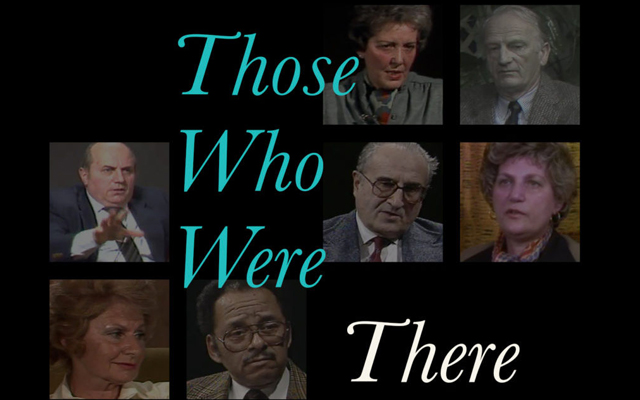“Those Who Were There: Voices from the Holocaust” is the only podcast dedicated to sharing the history of the Holocaust through the first-hand testimonies of survivors and witnesses.
During this first season of the podcast, we’ll be presenting 10 episodes, which are drawn from the audio portion of the archive’s videotaped recordings. In every episode, a survivor or witness shares their own story.
###
Eleanor Reissa: Hi, I’m Eleanor Reissa. Welcome to “Those Who Were There: Voices from the Holocaust”—a new podcast drawn from Yale University’s Fortunoff Video Archive for Holocaust Testimonies.
During the Holocaust, from 1939 to 1945, six million Jews were murdered by the Nazis and their collaborators. That was two thirds of all the Jews who lived in Europe. It was the largest genocide committed in history. The Nazis also murdered vast numbers of Polish people, Slavs, Soviet prisoners of war, and Romani people, along with political opponents, Jehovah’s Witnesses, and homosexuals.
The Fortunoff Archive opened its doors in 1982. It was built on the efforts of the Holocaust Survivors Film Project, which was founded three years earlier to record and preserve the stories of Holocaust survivors and witnesses. It was the first project of its kind. Now based at Yale University, the archive holds more than 4,400 testimonies recorded in over a dozen countries.
During this first season of the podcast, we’ll be presenting 10 episodes, which are drawn from the audio portion of the archive’s videotaped recordings. In every episode, a survivor or witness shares their own story. For example, you’ll hear from Celia Kassow, who joined the partisans to fight the Nazi occupation.
Celia Kassow: They wanted me to work in the kitchen, being a Jew and being a girl. They told me to dissect a pig. When I looked at that, and I started doing it, I fainted flat. I couldn’t do it. I said, “I’m volunteering for the patrol.” They say, “You? A Jewish girl in the patrol?” I say, “Yes.” I was given a horse. I was given ammunition. And I was given an assignment.
ER: You’ll also hear from Martin Schiller, who was just a child when he was sent to a slave labor camp in Poland.
Martin Schiller: I remember I walked by a spot and a guard hit me very hard over the head. After I recovered—because he did put me into sort of a semi-conscious state for a few minutes—I turned around, I said, He doesn’t know me. Why does he have such a hatred for me?
ER: And you’ll hear from Leon Bass, an African American educator from Philadelphia. As a young soldier in World War II, Leon survived the Battle of the Bulge and was among those who liberated a concentration camp in Germany.
Leon Bass: Really, racism is at the root of all of this. Under that umbrella comes bigotry and prejudice and discrimination. We haven’t come to grips with that institution called racism. And we have to, because we see the ultimate of racism, which was what I saw at Buchenwald.
ER: These are just three of the people you’ll meet in the episodes to come.
As the daughter of Holocaust survivors, I feel a close connection to these stories. My parents were both born in Poland. During the war, my mother fled to Uzbekistan and my father was imprisoned in Auschwitz. They met after the war in a displaced persons camp and immigrated to the United States. I didn’t learn until I was a teenager that my father had a first wife and daughter who were killed by the Nazis and a young son they sent to England to try to keep him out of harm’s way.
My parents didn’t speak of their traumatic experiences to me, which was common in those days. Many of the people you’ll hear in this podcast waited decades to tell their stories. But we are fortunate and grateful that they did, and that the Fortunoff Video Archive for Holocaust Testimonies was there to collect and preserve their oral histories.
I’ve spent most of my life working in the theatre and the performing arts. Every aspect of my work as a singer, writer, actor, director is influenced by this history—by my parents and my relationship to their fight, their suffering, and their hunger for living.
Like my parents, the people whose stories we will share in this podcast lived meaningful lives despite the suffering they carried with them. Through their recorded testimonies, we get a small glimpse into the unimaginable experiences that shaped them—and shaped our world. The voices of the survivors you’ll hear are also a stark reminder of the millions of people who didn’t live to tell their stories.
Please join us for this first season of the podcast as we listen to the stories of those who were there.
We hope you’ll also check out the podcast’s companion website, at thosewhowerethere.org. The website includes historical context for each episode, full transcripts, excerpts from the original videotaped interviews, and archival photographs.
“Those Who Were There” is a production of the Fortunoff Video Archive for Holocaust Testimonies, which is housed at the Yale University Library’s Manuscripts and Archives Department.
This podcast is produced by Nahanni Rous, Eric Marcus, and the archive’s director, Stephen Naron. Thank you to audio engineer Jeff Towne and to Christy Tomecek, Joshua Greene, and Inge De Taeye for their assistance. Thanks, as well, to Sam Kassow for historical oversight and to our social media team, Cristiana Peña and Nick Porter. Ljova Zhurbin composed our theme music.
Special thanks to the Fortunoff family and other donors to the archive for their financial support.
I’m Eleanor Reissa. Thanks for listening.
###

